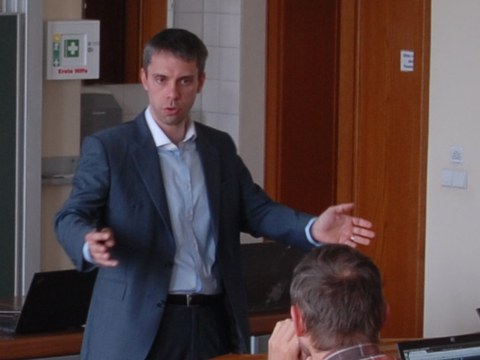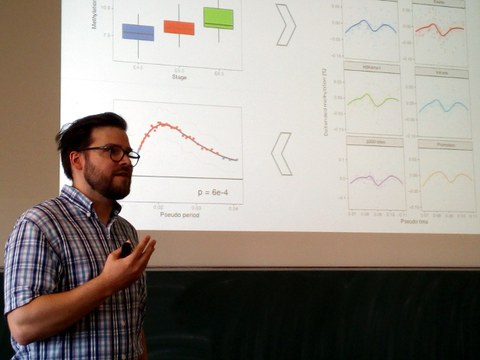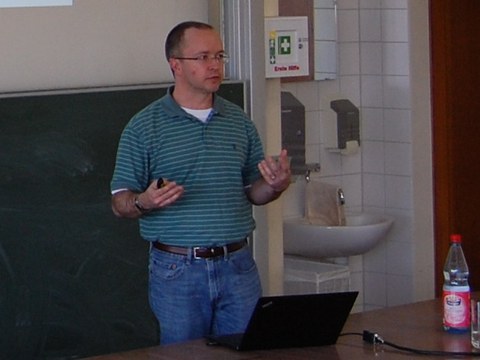History 2017
The ZIH colloquium is a public event and takes place on each 4th Thursday of the month at 15:00 o'clock in the room Willers-Bau A 317.
For additional or extraordinary events time and room are explicitly mentioned.
Divergent date: 7. September 2017, 15:00 Michael Wagner (Barcelona Supercomputing Center) "Experiences from the EU Centre of Excellence for Performance Optimization and Productivity (POP)"
Performance analysis is essential in the process of understanding application behavior, identify critical performance issues as well as adapting applications to new architectures and increasingly scaling HPC systems. However, in many cases expert knowledge and experience is required to identify the most productive direction of code refactoring. As a result, many codes used and developed by domain experts fall short in using the hardware efficiently, need much more compute time than needed, waste energy, require oversized and expensive hardware, or just miss research potential as their codes can only handle smaller or less complex problems. The EU H2020 Center of Excellence (CoE) for Performance Optimization and Productivity (POP) provides performance optimization and productivity services for academic and industrial codes. The services reach from a primary audit giving an overview of the behavior, performance and scalability of the application; to a detailed analysis with specific code optimization recommendations; up to a proof-of-concept implementation of the recommended optimizations. The talk will introduce the POP center of excellence and the provided services, give insight into the day-to-day work of identifying the main issues and areas for potential improvement, and discuss examples of successful analyses and code optimizations.
Michael Wagner received the M.Ed. degree in mathematics and computer science and the Ph.D. degree in computer science from the Technische Universität Dresden, Dresden, Germany, in 2008 and 2015, respectively. He was a research scientist in performance analysis at the Center for Information Services and HPC (ZIH), Dresden, Germany and is currently a HPC application analyst at the Barcelona Supercomputing Center (BSC), Barcelona, Spain. His research interests are in high performance computing with emphasis on performance analysis.

Robert Sieber
24.August 2017, 15:00 Robert Sieber (TUDAG) "In sieben Schritten zum
Servicekatalog"
Einen Servicekatalog für 20 unterschiedliche Organisationen in einem Konzern aufzubauen, ist eine wundervolle Aufgabe und eine Herausforderung. Robert Sieber zeigt am Beispiel der TU Dresden Aktiengesellschaft, wie das gelingen kann.Die meisten Servicekataloge sind technisch fokussiert. Auch das klar definierte Angebot von Salesforce.com ist mehr oder weniger technisch und funktional. Eine klare Struktur und transparente Preisgestaltung sind Voraussetzungen für einen guten Servicekatalog. Robert Sieber zeigt, wie Sie in sieben pragmatischen Schritten einen Servicekatalog in der Sprache der Nutzer und entlang Ihrer Arbeitswelt definieren.
CIO, Blogger & Podcaster - Für Robert Sieber ist IT-Service-Management eine Leidenschaft. Er ist CIO bei der TUDAG - TU Dresden Aktiengesellschaft. Hauptaugenmerk legt er dabei auf das Service-Portfolio-, Demand- und Providermanagement. Betrieb spielt nur eine sehr untergeordnete Rolle. Seit 18 Jahren ist Robert Sieber in den in verschiedenen Abschnitten des Lebenszyklus eines IT-Service tätig. Er selbst bezeichnet sich als Service-Nerd. Er stellt Menschen, Prozesse und die Geschäftsmodelle der Unternehmen in den Mittelpunkt des IT-Service-Managements.

Steffen Rulands
Divergent date: 15. June 2017, 15:00 Steffen Rulands (MPI PKS, Dresden) "Emergence and universality in the regulation of cell fate"
The development of an organism relies on the tightly orchestrated interplay of many cells. How do these cells build complex structures, like the heart? In this talk, I will show how collective dynamics emerge from the interaction of many molecules or cells, and how such emergence contributes to the mechanistic understanding of cell fate regulation. Combining single-cell genomics with statistical physics I will first show how collective dynamics in the primary layer of epigenetics - DNA methylation – may contribute to symmetry breaking in the early embryo. Moving from the molecular to the tissue scale I will then show that collective cell behaviour in growing tissues gives rise to a self-similar, “critical” dynamics of the progeny of marked cells, resulting in tissue-independent (universal) dependencies in lineage tracing experiments. Identifying these universalities provides the theoretical foundation to extract biological information from such experiments.
Since 2017 Steffen Rulands is a group leader at the Max Planck Institute for the Physics of Complex Systems in Dresden. From 2003 to 2009 he studied physics at the University of Constance and Technical University Munich. He obtained his Ph.D. in Theoretical Physics at Ludwig Maximilian University, Munich. After two years as postdoc he became a Herchel Smith fellow at the University of Cambridge from 2015 to 2016.
Divergent date: 20. April 2017, 15:00 Phil Carns (Argonne National Laboratory) "Characterizing HPC I/O: from Applications to Systems" (slides)
Scientific computing applications are becoming increasingly data-intensive in fields as diverse as biology, physics, and materials, and the computing facilities that support them are deploying increasingly complex storage technologies in order to meet demand. It is therefore more important than ever to understand the I/O behavior of applications as well as systems so that the community can implement effective optimizations, guide best practices, and procure more productive systems. This seminar will highlight recent advancements in understanding HPC I/O the context of Darshan, a widely-used application-level I/O characterization tool. This includes new mechanisms to vary the fidelity of instrumentation as well as new mechanisms to facilitate the correlation of application data with other forms of instrumentation. We will then highlight the broader TOtal Knowledge of I/O (TOKIO) project, a joint effort between Lawrence Berkeley Laboratory and Argonne National Laboratory, which seeks to leverage not only application-level instrumentation but component-level and system-level instrumentation to form a coherent, holistic view of I/O behavior. TOKIO integrates, correlates, and analyzes a diverse collection of data to produce actionable insight that interprets I/O performance in a broader system and historical context.
Philip Carns is a principal software development specialist in the Mathematics and Computer Science Division of Argonne National Laboratory, an adjunct associate professor of electrical and computer engineering at Clemson University, and a fellow of the Northwestern-Argonne Institute for Science and Engineering. His research interests in data-intensive scientific computing include characterization of storage systems, development of specialized data services, and simulation of storage architectures.
16. February 2017: Thomas Ihle (Ernst-Moritz-Arndt University Greifswald,
Institute for Physics) "Kinetic theory of active matter: coarse-graining and invasion waves"
Models of self-driven agents similar to the Vicsek model are studied by means of kinetic theory. In these models, particles try to align their travel directions with the average direction of their neighbors plus some noise. At low noise, a globally ordered state of collective motion forms. These models have a discrete time step, consist of a simple streaming and collision step and are easily implemented on a computer.
A kinetic theory is derived from an exact equation for the N-particle probability density using Boltzmann’s approximation of Molecular Chaos. A coarse-graining procedure, called Chapman-Enskog expansion is performed to derive hydrodynamic equations from the kinetic theory.
The kinetic theory is also solved numerically by a Lattice-Boltzmann-like algorithm. Steep soliton-like waves are observed that lead to an abrupt jump of the global order parameter if the noise level is changed. The shape of the waves is shown to quantitatively agree within 3% with agent-based simulations at large particle speeds. At small densities and realistic particle speeds, the mean-field assumption of Molecular
Chaos is invalid near the onset of collective motion, and correlation and memory effects become relevant.
I will show how to self-consistently include correlation effects at the level of ring-kinetic theory. Instead of just one kinetic equation, an additional equation for the time evolution of the two-particle correlations will be derived. This equation is solved numerically for a homogeneous system and shown to be in excellent agreement with agent-based simulations in certain parameter ranges.
Thomas Ihle studierte Physik an der Universität Leipzig, wechselte 1991 als Diplomand an das Forschungszentrum Jülich und promovierte 1996 an der RWTH Aachen. Nach Postdoc-Aufenthalten in Paris, Grenoble, Minneapolis und Stuttgart wurde Prof. Ihle 2004 an die North Dakota State University berufen, wo er 2010 Tenure erhielt. 2015 erfolgte die Ernennung zum Professor an der Ernst-Moritz-Arndt Universität Greifswald. Hauptarbeitsgebiete sind kinetische Theorie und Computersimulation selbstgetriebener Teilchen, Entwicklung teilchenbasierter Algorithmen für komplexe Flüssigkeiten sowie Musterbildung beim Kristallwachstum.


